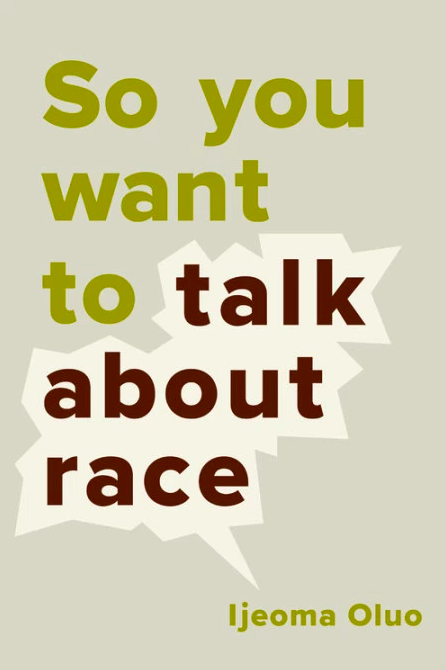
The Conversation I've Been Dreading: Ijeoma Oluo Talks About Race with Her Mom
'At this point I’m regretting the invention of the telephone.'
When my white mother gave birth to me, and later my brother, in Denton, Texas, she became the subject of a lot of racial commentary in her conservative southern community. But surprisingly, my mother and I had our first really substantive conversation about race late in my life, when I was 34 years old. I was well into my career in writing about culture and social justice and my opinions and identity around race were pretty well documented by then. But the truth is, like many families, our conversations growing up mostly revolved around homework, TV shows, and chores.
While I was growing up, my mother had given the obligatory speeches that all parents of black children must give: don’t challenge cops, don’t be surprised if you are followed at stores, some people will be mean to you because of your beautiful brown skin, no you can’t have the same hairstyle as your friends because your hair doesn’t do that. But those conversations were one-offs that ceased to be necessary once we were old enough to see the reality of race for ourselves.
Having a white mother, my siblings and I likely had even fewer conversations about race than black children raised by black parents, because there was a lot about our lives that our mother’s whiteness made it hard for her to see. My mother loved our blackness as much as was possible for any nonblack person to do, she loved our brown skin, our kinky hair, our full lips, our culture, and our history. She thought we were beauty incarnate.
Our mom never thought that our blackness would hold us back in life—she thought we could rule the world. But that optimism and starry-eyed love was, in fact, born from her whiteness. It was almost impossible for her to see all of the everyday hurdles we had to jump, the tiny cuts of racism that we endured throughout our lives. For our mom, we were black and beautiful and smart and talented and kind—and that’s all that mattered. And in the confines of our home, it was all that mattered. But as we left home, and our mom began to see us interact as adults with the real world, she began to suspect that there was more to being black in this world than she had previously thought. I could tell that this made my mom uncomfortable, to know that the babies that she had birthed from her own body had entire universes she couldn’t see, so the more that my world and my career became focused on race, the less my mom acknowledged it. She just really didn’t know what to say.
It was in this context that I received a voicemail from her one evening in 2015. It had the same unnecessary enthusiasm that all my mom’s voicemails seem to have, but the topic was definitely new.
“Ijeoma, call me. I’ve had an epiphany. About race. It’s important.”
I talk about race for a living, which means I have had a lot of uncomfortable conversations on the topic. Quite often, well-meaning white people will attempt to show me how much they “get it” by launching into racial dialogues filled with assumptions, stereotypes, and microaggressions that they are completely unaware of. I have cringed my way through so many of these discussions that you’d think they would have less effect on me. And while that is in some ways true—these conversations have become a bit easier with time—I was in no way ready to have this conversation with my mom. This is not because my mom means any harm or is in any way a worse offender than those who approach me after speaking engagements or readings (she’s not), it’s just—she’s my mom and nobody likes to discuss race with their mom.
Here’s the thing about my mom, my mom is the kindest, most generous person I’ve ever known. And she is a wonderful mother and grandmother, beloved by just about all who meet her. But she’s also exhausting. My mother does not think before she speaks, nor does she at least take the time to collate her subjects before shouting ten different conversations at you (she refused to get hearing aids for a very long time, so when I say “shouting” I mean shouting). My mom is at times a nonsensical tornado of emotion, enthusiasm, and whimsy. A conversation with her about grocery shopping (which will inevitably wander to a conversation on organic gardening, which will remind her of a joke about potatoes she heard but cannot remember the punchline for) can utilize all of my patience and conversational skills. I love my mom dearly, but I have been rolling my eyes at her for 36 years—I am forever a bratty teenager in her presence.
I was trying to think of anything I’d like to do less than call my white mother to hear her epiphany about race, when she did what all mothers do—she immediately called back, and kept calling, until I picked up the phone.
“Did you get my message?” she asked.
“Yes,” I sighed, “You had an epiphany?”
“OK,” she dove in before I could run away, “So I was telling a joke at work, and it had a black punchline—not like, a punchline about black people, but a punchline for black people . . . ”
This is the part of the conversation where I start cringing. I need you to hear my mom’s chipper Kansas accent as she says this.
“. . . and this coworker of mine, he’s black, says, ‘What do you know about being black?’”
This is the part of the conversation where I’m inhaling sharply. I really don’t want to know what happens next because I cannot imagine any way that it is good.
“Like, he was challenging me, you know? Probably thinking, ‘this white bitch.’”
At this point I’m regretting the invention of the telephone.
“And I was so mad, I was like, this man doesn’t know me. He doesn’t know what I went through, he doesn’t know that I have two black kids.”
I’m at this point holding the phone a good six inches away from my ear in the hopes that it will make this conversation less painful. Please tell me she didn’t actually say these things to this man.
“But then I realized . . .”
Oh no.
“. . . that he’s probably gone through so much racism in his life, he doesn’t know who the good white people are.”
What is she saying? WHAT IS SHE SAYING? HAS SHE NOT READ ANY OF MY WORK? Please let the earth open up and swallow me so I can get out of this conversation.
“And if I were black, I’d probably be really angry all the time, too.”
Aaannnd we’ve now officially entered the worst conversation in the world. I’m talking with my white mom about race. Why can’t we be talking about, I don’t know—her sex life, or my sex life, or my period, or why I’m an atheist—anything but this.
“So now I’m not angry at him anymore. I’m just going to go to him tomorrow and explain that I have two black kids and I understand where he’s coming from.”
And here is where I shouted “NOOOOOO!” like in those movie scenes where your buddy is about to open a car door that will so obviously set off a bomb that will kill him. As uncomfortable as this conversation was, it needed to happen. The initial discussion led to a very long talk about race and identity and the differences between being a white mother who has loved and lived with black people, and being an actual black person who experiences the full force of a white supremacist society firsthand. She asked if she at least got black credit for doing my hair for all of those years. I said no. She asked why I didn’t identify as “part white” when my mother, her, was white. I explained that while I had definitely inherited light-skin privilege due to my mixed heritage I did not feel that whiteness was something that any person with brown skin and kinky hair could inherit, because race doesn’t care what your parents look like—just look at all the lightskinned slaves sold away from their black mothers by their white fathers. We talked about how to discuss race without placing undue burden on people of color to educate you. We talked about when to not discuss race (say, in the middle of the workday when your black coworker is just trying to get through a day surrounded by white people). We ended the conversation exhausted and emotional, but with a greater understanding of each other.
After this conversation, the way in which my mom interacted with me changed in ways that I was not expecting. She still calls me to talk about work drama, but also this funny movie she saw, and also perhaps her dream of us all building a cabin in the woods together one day. I still roll my eyes like the thirty-something teenager that I am throughout most of our conversations. But my mom has become more fearless in her support of my work, now that she better understands the role she can play. My blackness is no longer a barrier between us, a symbol of my world that she does not have access to and therefore must avoid fully acknowledging. My mom has shifted her focus on race from proving to black people that she is “down” to pressuring fellow white people to do better.
My mom is now an outspoken advocate for racial equality in her union. And now that the awkwardness has passed, and now that my mom and I have a better understanding of each other, I can talk with her more freely about my life and my work. And while one conversation did not do all of that on its own, it opened up a new way of seeing each other and how we can truly come together as a black daughter and her white mother. So for all its awkwardness, the outcome of that conversation makes me so glad we talked. I’m also glad we talked because I’m pretty sure our conversation stopped my mom from leaving her next conversation with her coworker in tears or being dragged into HR.
*
Not all of us are lucky enough to have conversations on race with white people willing to take the emotional risk of investigating the role they play in upholding racism. Not all of us are lucky enough to leave an office discussion on race with no worse than a snide comment and a slightly bruised ego. These conversations, when done wrong, can do real damage. Friendships can be lost, holidays ruined, jobs placed in jeopardy. For this reason, many people avoid the topic of race altogether and recoil when it’s brought into conversation.
But you are reading this because you realize that we have to talk about race. Race is everywhere and racial tension and animosity and pain is in almost everything we see and touch. Ignoring it does not make it go away. There is no shoving the four hundred years’ racial oppression and violence toothpaste back in the toothpaste tube.
In fact, it’s our desire to ignore race that increases the necessity of its discussion. Because our desire to not talk about race also causes us to ignore race in areas where lack of racial consideration can have real detrimental effects on the lives of others—say, in school boards, community programs, and local government. And while it may seem that people of color always need to “put race in everything,” it’s the neglect of the specific needs of people of color, which exist whether you acknowledge them or not, that necessitate it in the first place.
As a black woman, I’d love to not have to talk about race ever again. I do not enjoy it. It is not fun. I dream of writing mystery novels one day. But I have to talk about race, because it is made an issue in the ways in which race is addressed or, more accurately, not addressed. When my employer enforces hairstyles in their dress code that ignore the very specific hairstyle needs of black women (see military restrictions against small braids, for example), then my employer is making race an issue in their attempts to ignore it. When my son’s school only has parent-teacher conferences during school hours, they are making race an issue by ignoring the fact that black and Latinx parents are more likely to work the type of hourly jobs that would cause them to lose much-needed pay, or even risk losing their employment altogether, in order to stay involved in their child’s education. When I take my kids to movies and none of the characters they see look like them, it’s the studio that is making it about race when they decide to make up entire universes in which no brown or black people exist. I just want to go to work, educate my kids, and enjoy a movie.
The truth is, we live in a society where the color of your skin still says a lot about your prognosis for success in life. This is the reality right now, and ignoring race will not change that. We have a real problem of racial inequity and injustice in our society, and we cannot wish it away. We have to tackle this problem with real action, and we will not know what needs to be done if we are not willing to talk about it.
So let’s all get a little uncomfortable. If my mom and I can do it, so can you.
__________________________________
From So You Want To Talk About Race by Ijeoma Oluo. Copyright © 2018. Available from Seal Press, an imprint of Perseus Books, LLC, a subsidiary of Hachette Book Group, Inc.
Ijeoma Oluo
Ijeoma Oluo is a Seattle-based writer, speaker & internet yeller. She was named one of the most influential people in Seattle by Seattle Magazine. She's the Editor-At-Large at The Establishment - a media platform run and funded by women.




















